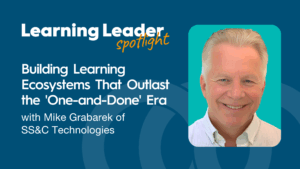Podcast Summary – Building Learning Ecosystems That Outlast the 'One-and-Done' Era with Mike Grabarek of SS&C Technologies

From Engineering Equations to Human Potential
Mike Grabarek never expected his career to shift from engineering missiles to developing people. After earning both his undergraduate and graduate degrees in engineering, he spent more than a decade in aerospace, using statistics and calculus to model the accuracy of ballistic missiles. Yet, what truly energized him was teaching complex ideas in ways others could understand.
That realization guided him toward the learning and development field and, eventually, to General Electric’s legendary Crotonville Leadership Institute during the Jack Welch era. “I found I loved helping others solve problems and grow,” Mike recalls. “I’m harvesting about 35 years of skills — diagnosing performance challenges, coaching, building learning experiences — whatever helps people and teams do more than they thought they could.”
Today, as Associate Director of Corporate Learning & Development at SS&C Technologies, Mike channels that engineering mindset into leadership development and performance consulting; bridging data, design, and human insight.
Experimentation as a Leadership Habit
For Mike, the key to innovation in corporate training is disciplined experimentation. He believes leaders and learning professionals alike must adopt a scientific mindset; testing, observing, and iterating rather than waiting for perfect answers.
Some experiments blow up in my face; some work fantastically. But the more you experiment, the more you move forward in your career.
- Mike Grabarek
This philosophy shapes how he designs leadership programs and learning ecosystems. Whether it’s piloting a new coaching model or refining a blended-learning approach, experimentation builds adaptability — a trait every learning and development (L&D) consultant and organization needs to stay competitive.
Rethinking the Learning Experience
Reflecting on how L&D has evolved, Mike contrasts the traditional “one-and-done” workshop with today’s continuous learning ecosystem. In his view, pre-work through eLearning lays the foundation, while live sessions focus on practice, role play, and reflection. “Learning is not a single event anymore,” he explains. “It’s a spaced process — learn, apply, reflect, reinforce.”
He also underscores the modern attention challenge. “People read an email for about 12 seconds before moving on. If you don’t capture attention quickly, you lose it,” he says. For him, designing micro-learning and concise modules is not just about convenience. It’s about aligning with how professionals actually learn in today’s workplace.
Communication: The Human Edge in a Tech-Driven World
As artificial intelligence and digital tools become more embedded in corporate learning, Mike insists that communication remains the defining skill of the future. “Data tells you what’s happening,” he says, “but it’s your ability to communicate that gets people to say yes.”
He teaches leaders to look beneath the surface of conversations through a model he calls Seeing the Unseen in Conversations; five hidden layers that shape every dialogue. By listening for tone, intent, and emotional context, leaders can build alignment and trust.
“AI can support the what and why,” he notes, “but only humans can build connection.”
Coaching in the Flow of Work
Looking ahead, Mike envisions a future where learning happens in the moment rather than after the fact. He imagines tools like lightweight glasses that can record a meeting, then prompt the wearer to reflect. “Imagine finishing a client conversation,” he says, “and your system instantly gives feedback or a short coaching dialogue to help you improve.”
This just-in-time feedback loop — a blend of AI in corporate learning and human insight — could revolutionize leadership development. He predicts that classrooms will shift focus from knowledge delivery to skill embodiment.
We’re moving learning from the head into the body.
- Mike Grabarek
Mentorship That Feels Natural
Beyond technology, Mike believes mentorship remains one of the most powerful accelerators of leadership growth — but it has to happen organically. After interviewing more than 100 senior leaders, he noticed a consistent theme: “Formal mentoring programs don’t work as well as organic ones. Real mentoring happens when leaders feel responsible for helping others succeed.”
He advocates for cultures where leaders naturally take ownership of developing their people — creating an environment of learning agility and shared accountability.
He also underscores the modern attention challenge. “People read an email for about 12 seconds before moving on. If you don’t capture attention quickly, you lose it,” he says. For him, designing micro-learning and concise modules is not just about convenience. It’s about aligning with how professionals actually learn in today’s workplace.
The Five Levers of Accelerated Leadership
Drawing from decades of experience, Mike outlines five levers that consistently drive faster leadership development:
- Varied experiences — rotations across roles, functions, and geographies.
- High-risk, high-visibility projects that stretch capabilities.
- Coaching and mentoring as embedded practices.
- A growth mindset that encourages curiosity and experimentation.
- Structured learning delivered in spaced, reinforced cycles.
Together, these elements build leaders who think critically, act decisively, and inspire others — the same outcomes every corporate learning and development program strives to achieve.
Language, Mindset, and the Stories We Tell
When asked about books that shaped his thinking, Mike points to Language and the Pursuit of Happiness by Chalmers Brothers. The book explores how the stories people tell themselves influence their actions. “It’s about separating facts from the narratives we create,” Mike says. “As a coach, I help people see the story they’re telling — and decide if it’s serving them.”
That reflection lies at the heart of Mike’s work: combining analytical rigor with human awareness to help people see new possibilities in themselves and their teams.
What Skills Do Learning Leaders Value Most in 2025?
Final Thoughts
Mike Grabarek’s career embodies the evolution of modern L&D — a shift from formal instruction to strategic learning ecosystems driven by curiosity, communication, and continuous experimentation. His journey from rocket science to people science is proof that data and empathy can coexist — and that every leader has the capacity to learn, adapt, and grow.
“Progress comes from experimentation,” Mike reminds us. “Don’t take yourself too seriously. Laugh, recover, and try again.”
Resources and Recommendations
Ready to Work with Us?
Does your L&D team have more projects than people? TrainingPros has been named a Top 20 Staffing Company internationally by Training Industry, and recognized as a Smartchoice® Preferred Provider by Brandon Hall Group for 2025. We’re also proud to be named a Champion of Learning by the Association for Talent Development (ATD)—an international honor that reflects our dedication to excellence in corporate learning. These accolades underscore TrainingPros’ unwavering commitment to delivering high-quality, tailored training solutions.
If your projects need instructional design consultants, eLearning developers, or other learning & development consultants for your custom content projects, reach out to one of our industry-expert relationship managers today.
When you have more projects than people™, let TrainingPros find the right consultant to start your project with confidence. Schedule a consultation today.
